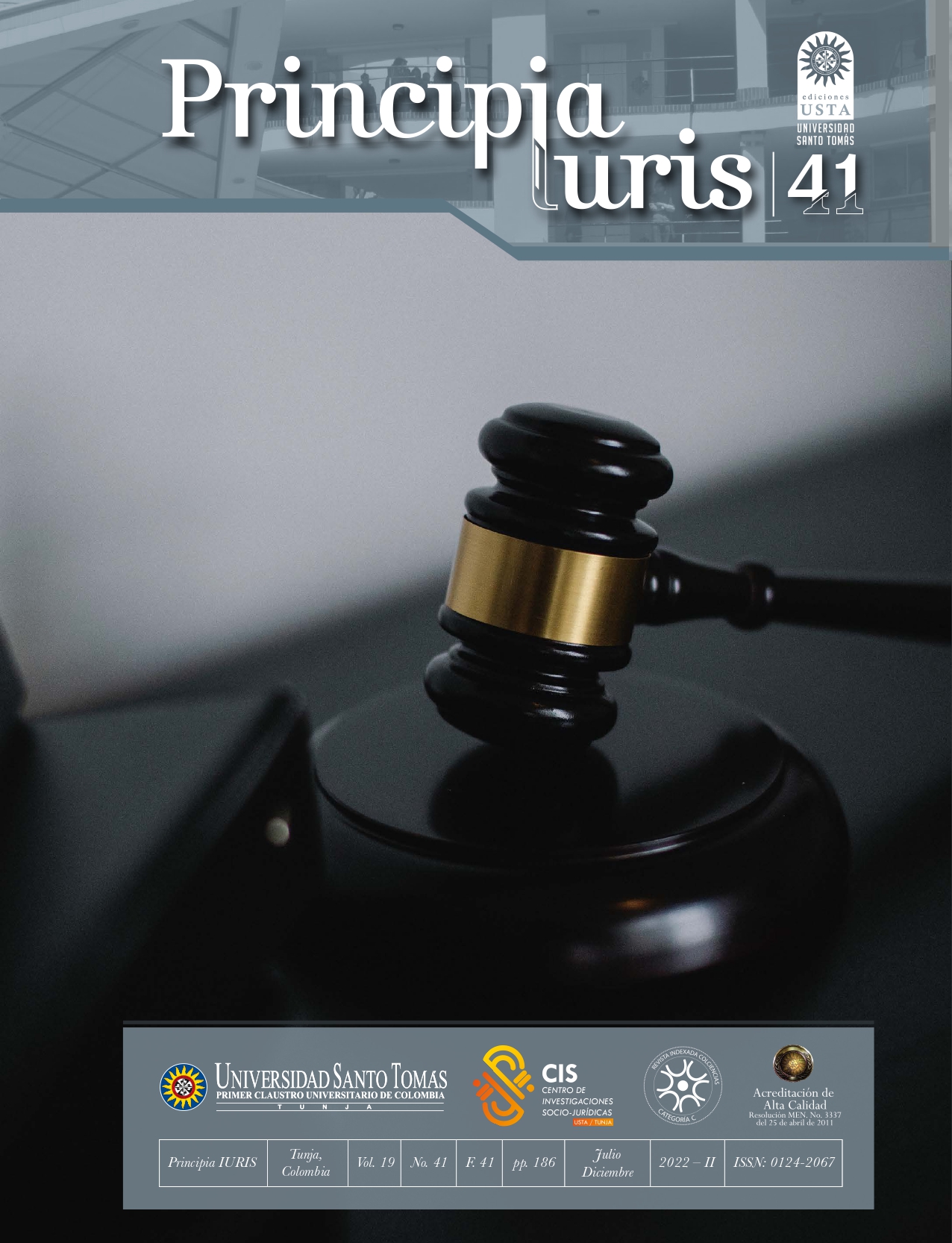TACIT WITHDRAWAL: A SOURCE OF NATURAL OBLIGATIONS
Main Article Content
Abstract
The tacit withdrawal, is one of the abnormal ways of ending the process, instituted since Law 105 of 1890, it has also been called, expiration of the instance or perenniality. The reason behind the decision is the abandonment or inactivity of the process at the request of the party. Article 317 of the General Code of Procedure regulates the procedural act, nefariously sanctioning the litigant, with the extinction of the right sought, when it is decreed a second time between the same parties and in the exercise of the same claims.
The consequence falls on the right of action, according to the proportionality study carried out by the Constitutional Court in judgment C-1186 of 2008, which declared the consequence envisaged in law 1194 of 2008 enforceable; judgment that applies to article 317 of the CGP, without, as the judgment warned, the substantial right is lost, what is lost is the right of action. When the intended right is extinguished, the obligation is devoid of action, becoming a natural obligation, at the discretion of the debtor, the procedural action is not a way to decongest the judicial offices, as expressed by the litigants, it is the sanction to their litigation neglected, resulting in the withdrawal of the action, and hence its extinction. Obviously, the tacit withdrawal is an input for decongestion, but it is for the obligation the cause of changing from civil obligation to natural, by not conferring the right to demand its fulfillment. Therefore, in article 1527 of the Civil Code, this new natural obligation must be included.
Article Details
Por medio de esta comunicación certifico que el artículo que estoy presentando para posible publicación en la revista institucional impulsada de la Facultad de Derecho de la Universidad Santo Tomás seccional Tunja, Principia Iuris, es de mi entera autoría, siendo sus contenidos producto de mi directa contribución intelectual.
Todos los datos y referencias a publicaciones hechas están debidamente identificados con su respectiva nota bibliográfica y en las citas que se destacan como tal.
Por todo lo anterior, declaro que el material presentado se encuentra conforme a la legislación aplicable en materia de propiedad intelectual, y por lo tanto, me hago responsable de cualquier reclamación relacionada a esta.
En caso de que el artículo presentado sea publicado, manifiesto que cedo plenamente a la Universidad Santo Tomás seccional Tunja los derechos de reproducción del mismo y accedo a las modificaciones que de forma se requieran para adaptarse a la estética de la revista. Como contraprestación de la presente cesión, declaro mi conformidad de recibir (2) ejemplares del número de la revista en que aparezca mi artículo.
References
Acción de tutela STC11191-2020. Radicación No. 1100122030002020144401. (Corte Suprema de Justicia de Colombia, 09 de diciembre de 2020)
Alarcón Rojas, F. (2011). La ineficacia de pleno derecho en los negocio jurídicos. Bogotá: Universidad Externado de Colombia.
Azula Camacho, J. (2008). Manual de derecho procesal. Bogotá: Temis.
Cabanellas, G. (2003). Diccionario jurídico elemental. Buenos Aires: Heliasta.
Carrión L., J. (2004). Tratado de Derecho Procesal Civil, vol. I. Lima: Grijley.
Colombia, Congreso de la República de. (26 de Mayo de 1873). Código Civil Colombiano. Bogotá: Diario Oficial No. 2.867.
Colombia, U. C. (2010). Manual de derecho procesal (Primera ed., Vol. I). Bogotá: Universidad Católica de Colombia.
Congreso de la República de Colombia (07 de julio de 1998). Ley 446 de 1998. Diario Oficial: 43.335.
Congreso de la República de Colombia (07 de marzo de 1996). Ley Estatutaria de la Administración de Justicia (Ley 270 de 1996). Diario Oficial: 42.745.
Congreso de la República de Colombia (08 de enero de 2003). Ley 794 de 2003. Diario Oficial: 45.058.
Congreso de la República de Colombia (09 de mayo de 2009). Ley 1194 de 2008. Diario Oficial: 46.984.
Congreso de la República de Colombia (12 de julio de 2012). Código General del Proceso (Ley 1564 de 2012). Diario Oficial: 48.489.
Congreso de la República de Colombia (15 de abril de 1887). Código Civil (Ley 57 de 1887) Diario Oficial: 7.019.
Congreso de la República de Colombia (17 de octubre de 1931). Ley 105 de 1931. Diario Oficial: 21.823.
Congreso de la República de Colombia (22 de enero de 2009). Ley 1285 de 2009. Diario Oficial: 47.240.
Congreso de la República de Colombia (24 de noviembre de 1890). Ley 105 de 1890. Diario Oficial: 8.296.
Congreso de la República de Colombia (31 de mayo de 1873). Código Civil de los Estados Unidos de Colombia (Ley 84 de 1873) Diario Oficial: 2.867.
Constitución política de Colombia [Const.] (1991). 2a. ed. Legis
Corte Constitucional de Colombia (03 de diciembre de 2008). Sentencia C-1186/08. (Magistrado Ponente: Manuel José Cepeda Espinosa).
Corte Constitucional de Colombia (09 de diciembre de 2020). Sentencia STC11191- 2020. (Magistrado Ponente: Octavio Augusto Tejeiro Duque).
Cubillos, Héctor (2007). La pretensión procesal y su resistencia. BOGOTÁ: SABIDURÍA LIMITADA.
Devis Echandía, H. (1988). Compendio de derecho procesal (Novena ed., Vol. III). Bogotá: ABC.
Devis Echandía, H. (2000). Teoría General del Proceso (3 ed.). BOGOTÁ, BOGOTÁ, COLOMBIA: UNIVERSIDAD.
González Gómez, E. (s.f). De las obligaciones en el derecho civil colombiano. COLECCIÓN PEQUEÑO FORO.
Instituto Colombiano de Derecho Procesal. (1999). Derecho Procesal (Primera ed.). Bogotá: Universidad Externado de Colombia.
Nossa, l. P. (2014). De los contratos mercantiles nacionales e internacionales. Bogotá: ecoe.
Obligaciones civiles, deberes morales y obligaciones naturales. En qué consisten y sus características fundamentales, José Isidro Sierra Vrs. José Silverio Muñoz y Ernestina Sierra (Corte Suprema de Justicia 25 de Agosto de 1966).
Olmos H., R. (2002). Pretensiones procesales en el Código Civil. Lima: Grijley
Presidencia de la República de Colombia (06 de agosto de 1970). Código de Procedimiento Civil (Decreto 1400 de 1970). Diario Oficial: 33.150.
Presidencia de la República de Colombia (25 de noviembre de 1991). Decreto 2651 de 1991. Diario Oficial: 40.177.
Quiroga Cubillos, H. E. (2007). La pretensión procesal y su resistencia (SEGUNDA ed.). BOGOTÁ: EDITORIAL SABIDURÍA LIMITADA.
Real Academia Española, RAE (2017). Diccionario de la lengua española. Recuperado de www.rae.es.

